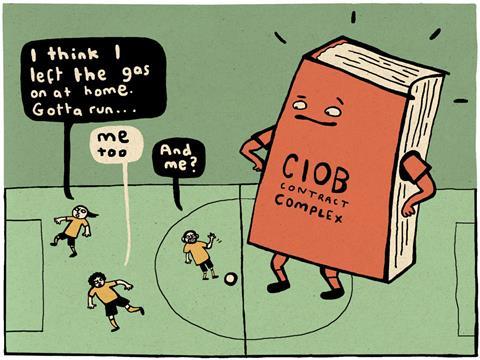The new CIOB contract: Another standard contract that nobody will ever have the time or energy to read

Let’s have a chat about this proposed new contract document. It has been, or is being now, invented by some very clever folk. It is called the CIOB Contract for Complex Projects. Wow, they have worked so hard on this, er, complex document. But first let me take you to another very good effort; it is a report by EC Harris about construction disputes across the globe. More particularly, it is about disputes on large and complex projects. There’s that word again.
EC Harris’ disputes team is called Contract Solutions. Its report starts with a beating of breasts: “Too many construction schemes become embroiled in disputes” … “cost millions” … “extremely disruptive” … “bring headaches”. So what’s new? For decades those same woes have been woed. The plain truth is that construction disputes are so very, very ordinary. Live with it. Manage it.
EC Harris then goes into the worldwide Top five causes of disputes. In the UK it is:
- “Failure to administer the contract”
- “Conflicting party interests”
- “Unrealistic risk transfer from employer to contractors”
- “Employer imposed changes”
- “Ambiguities in the contract documents”.
In the US, it’s an almost identical list. Then in the Middle East the same causes crop up plus “incomplete design information from the employer”. Asia is dealt with, so too mainland Europe, and blow me down, the same causes of disputes crop up.
All this is very encouraging. Across the construction world, it is certain that:
1. Disputes are the norm, like it or lump it
2. The players are partisan
3. They do not understand the contract forms
4. Change orders drive disputes
5. Exploitation is adored.
And we all love it! Truth? We treat construction rules, the contractual bumf, as a sport … and we want to win each game.
Now let’s come back to this new contract document that is about to hit the pitch. Will the authors take note of what EC Harris says about another contract document? “Another unfortunate but all too frequent outcome is the shaping of a project around the contract, rather than the contract being developed around the project characteristics. This failure also stems from clients being advised to adopt contracts such as NEC3 without fully appreciating the level of administration and involvement required.”
Oh, oh, EC Harris, what have you said? Do those fancy words mean that NEC3 takes a whole load of top brains at no small cost to make it work?
The new CIOB complex contract has 64 clauses. So too, I think, will the new subcontract. Well then, let’s have another truth. No one, absolutely no one who is a real builder of buildings, and that includes all of the subcontractors and sub-subcontractors, will ever read this new building contract.
No real builder of buildings reads the JCT documents, nor NEC, nor PPC 2000, nor FIDIC, nor over the decades GC/Works/1, the DOM, NAM, NOM/SUB. Nor have they read any of the hundreds of times these forms have been fiddled with. Building roads, sewers, schools, office blocks is a daily fighting of fires. It’s tough enough coping with all the real-life ups and down of men, materials, plant, weather, cock-ups and slight of hand without having to thumb your way into clauses, rules and risk registers. Real building contractors just get on with it.
So, I have a challenge for the CIOB. My premise is that none of the forms of contract are understood by one jot by our industry.
So, instead of piling on the agony, turn the game on its head. Make the contract form dead simple. Throw out your 64 pages. You can have four. Go to the few crucial things that matter … you already know which ones.
None of the plasterers that I know can remember much of what they learned when they took their law degree, so that’s what you have to contend with. Large complex projects will have 25 subcontractors and 100 sub-subcontractors. None will give a tuppenny-damn about anything more than doing a good job on time for, wait for it, payment now and - would you believe - a profit.
Come on CIOB, keep it simple! Nothing has worked thus far anywhere in the world. Ask EC Harris.

Tony Bingham is a barrister and arbitrator at 3 Paper Buildings, Temple




























No comments yet